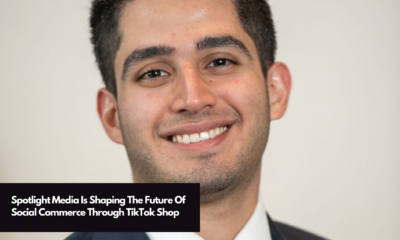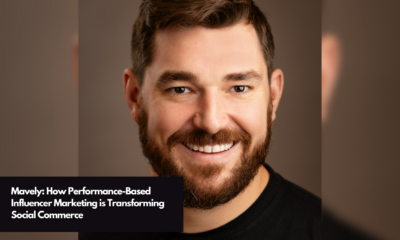Agency
Rhapsody Voices’ Mike Jensen Reveals His Secret To Authentic Creator Partnerships
Mike Jensen, a veteran of the digital media revolution at companies like AOL and Stitcher, launched his own venture called Rhapsody Voices in 2023. His aim is for the startup to be a “boutique at scale” platform curating a selective collective of podcasts to connect creators with brand sponsors.

Mike emphasizes maintaining an authentic connection by closely collaborating with creators on everything from production to sponsor curation. Rhapsody is actively tapping niche audience passions, like its “surfer network,” which caters to older surf culture enthusiasts.
With over a year under its belt, Rhapsody Voices is staking its future on delivering hyper-relevant long-form content that resonates with passionate niche audiences. Mike believes this approach can provide a sustainable path for creators amid a challenging media landscape.
Rhapsody as a ‘Boutique at Scale’ for Podcast Creators
Mike has spent over two decades at the forefront of the digital media revolution, from the early days of internet advertising at AOL to the podcast boom at companies like Stitcher and iHeartRadio. He took the lessons he learned to launch Rhapsody Voices.
“I’ve really enjoyed being a part of big companies and also being a part of startups,” Mike says. “What I’ve realized in terms of working with creators and working with sponsors is that if you can combine the nimbleness of a startup and still provide the resources of a big organization, you can be boutique at scale.”
That’s the approach Mike is taking with Rhapsody. “We’re very careful and purposeful. We probably could have many more shows than we do. But we’re selective with a purpose. It’s like a boutique hotel. You don’t need seven restaurants and seven swimming pools. You just need one great experience.”
The idea for Rhapsody emerged from Mike’s interactions with creator partners who wanted to work with him more directly. “There were shows that I had worked with for years that said, ‘Mike, if you go out on your own, we’ll go with you,'” he recounts. “That was very complimentary. And it came at a time in my life that was pretty important to me to have that kind of support.”
The industry veteran chose the name “Rhapsody” both for its connotation of passion and personal resonance, having grown up on Rhapsody Drive. “Rhapsody as an adjective is very passion-based. I’m always involved with people with voices… I could look at a hundred other good names for a company, but this one seems to tie to me personally and has a good fit professionally.”
While building his venture, Mike faced the quintessential challenge of entrepreneurship – learning to be comfortable with incomplete to-do lists. “As an entrepreneur, you have to begin to build comfort around not everything’s going to get done today. And that doesn’t mean that you weren’t successful,” he explains. “It means that that’s the mindset that you just kind of have to have where it just kind of feels like that because you’re building something, it doesn’t always ever feel complete.”
With his startup now over a year old, the media maverick is focused on providing podcasters the resources of a large company with the attentive service of a boutique firm. As the podcast market continues to grow, Mike wants Rhapsody to harmonize creators and brands through curated partnerships.
Fostering Authenticity Through Close Creator Partnerships
For Rhapsody Voices, maintaining an authentic connection between creators, sponsors, and audiences is paramount. Mike emphasizes the company’s focus on empowering creator voices through hands-on collaboration.
“Our messaging is that connectivity between our shows, sponsors, and our hosts,” he says. “In roughly about 15% of the shows, we’re doing production, including audio and video, to help that creator who really wants to have somebody that they feel comfortable is helping build the voice of the show.”
According to Mike, whatever it takes to facilitate that authenticity, from production assistance to sponsor curation, is part of Rhapsody’s modus operandi. “I don’t envision a world in which we have so many shows and creators that we don’t intimately know each and every show – what the listener viewership is, some of the nuances of the show, details in terms of the personality of the creator and what they feel comfortable and not comfortable with in terms of sponsors,” he explains. “That’s where we’ll stand out.”
The company aims to stay ahead of technological shifts by viewing its approach through the audience’s lens. “We try to look at what we’re building from a content perspective, or represent if we’re not doing every aspect of the content build, and look at it from the eyes of the audience,” Mike says. For now, that means leaning into long-form podcasting and video extensions while using short-form platforms like TikTok only for promotion.
Ultimately, Rhapsody Voices hopes to provide a sustainable path for creators to build viable careers amid a challenging media landscape. “Our creator economy can be a vehicle for more great long-form content creators, not less like we’ve been hearing the last number of years when you think about what’s happening in the journalistic and media space,” says the CEO. “That’s where I think we can power that.”
Tapping Into Niche Passion Points
As podcasting’s popularity soars, Mike sees ample room for further growth by catering to highly passionate niche audiences. He says Rhapsody Voices is actively seeking these untapped segments of listener demand.
“We’re always looking within that overall ecosystem for what we view as white space—what content creator we’ve found or something that we’re talking about creating together that is not necessarily widespread out there.”
For example, Mike cites Rhapsody’s “surfer network,” which caters to older, culturally engaged surf enthusiasts. “These are lifetime surfers. There are folks in my age group out there, like 40+, who love the culture and all things around surfing, which tends to lean into environmental best practices and cultural and health and wellness,” he states. “The people on those shows have an unbelievable passion for the content.”
According to Mike, by zeroing in on niche interests like this, Rhapsody can attract sponsors to engage those dedicated listener bases. He hints at more focused networks on the horizon: “There are some new opportunities that we’re launching that drive into some travel-meets-education side of things.”
Prioritizing Creator Input and Audience Feedback
Mike stresses the importance of close collaboration with creators and attentiveness to audience feedback in shaping Rhapsody Voices’ offerings.
“We try to be highly educational about who’s interested in sponsoring the show, and we try to elicit feedback from the creator as far as why they think that sponsor would be a fit,” he says of the vetting process.
Rhapsody also closely examines metrics like consumption rates and reviews across platforms to identify areas of high engagement or potential weaknesses. “We’ll carefully look at that feedback and overall comments and the frequency of them,” Mike explains.
This two-way dialogue—seeking creator buy-in while remaining responsive to listeners—allows Rhapsody to adapt its approach nimbly. As Mike states, “It’s really hard for us to have success unless we collaborate closely with the creator.”
Calling for Greater Industry Collaboration
While praising the overall growth of the podcasting ecosystem, Mike voiced some frustration with the fragmented landscape and lack of universal best practices.
“It’s a challenge sometimes – the fragmentation of not just the different types of platforms, but also where to go to find information,” he laments. “We have a number of large organizations that drive a lot of the coordination of how the ecosystem works.”
Mike cites the influence of major players like Google, Spotify, Apple, and others in setting separate policies and processes. “They’ll share certain things and not share other things… And so we’re trying to cobble together best practices for creators to get paid for their work, and for the people that are in partnership with them to also make a living at this. And sometimes it’s complicated.”
His proposed solution? “Podcasting would benefit from more oversight from an organization where inclusion is based on proof of following the best practices outlined by that organization. The makeup of that organization and leadership is determined by following best practices, and it welcomes all with modest financial commitments to be a member rather than having critical operational details largely driven by a number of huge organizations.”
As podcasting’s influence grows, Mike advocates for increased collaboration and transparency among the major industry players. Aligning around consistent standards, he argues, will better serve creators and their partnerships with brands.













